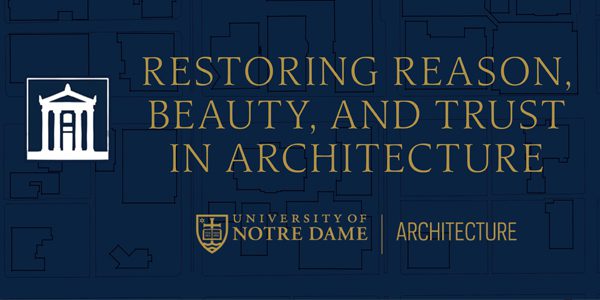Finding Meaning and Mission in a Restless World – The Heart’s Desire & Being on the Margins
Subscribe to the ThinkND podcast on Apple, Spotify, or Google.
Featured Speakers:
- Rev. Daniel G. Groody, C.S.C., Vice President and Associate Provost; Associate Professor of Theology and Global Affairs, University of Notre Dame
- Lou Nanni, Vice President of University Relations, University of Notre Dame
The second live podcast of The Heart’s Desire series featured Lou Nanni, the Vice President of University Relations at the University of Notre Dame. The event was moderated by Rev. Daniel G. Groody, C.S.C., the Vice President, Associate Provost and an Associate Professor of Theology and Global Affairs at the University of Notre Dame. Before coming to work at Notre Dame, Lou Nanni graduated from the University of Notre Dame, spent two and half years serving the vulnerable in Chile, fostered a relationship between the Diocese of Orlando and a poor diocese in the Dominican Republic, and served as the Director of the Center for the Homeless in South Bend, IN. Nanni shared his foundational experiences throughout these roles and the values that have formed him into the passionate yet humble Catholic he is today.
Nanni grew up in a small town in Western New York as the youngest of four children. He studied PLS at Notre Dame, where he was forced to ask questions at a deeper level. One of these questions, “Are we progressing as a human civilization over time?”, guided him to his life of service and the decision to pursue his experience in Chile. Though moving to a developing country for an extended period of time was a difficult decision, Nanni discerned the decision and was motivated by a desire to live amongst the poorest of the poor and to experience the lack of material possessions that he had become accustomed to living in the United States. He needed an experience to ground him in his identity and his faith. Though this experience was a challenging one, with many days that were spiritually disruptive and emotionally draining, Nanni now talks very positively about the experience. While in Chile, he saw immense suffering and hit a deep level of despair, but he also found hope in the authentic examples of sacrifice the people there made for him. Upon returning home, he returned to the University of Notre Dame to study in the International Peace Studies program founded by Father Hesburgh.
As a member of this program, Nanni had the ability to study the problems he had experienced firsthand in Chile. He discovered that people all over the world are brought together in their brokenness and weakness. People don’t want to search for a common agreement, but instead seek to be understood. Really listening to another individual and making them feel heard can further our common humanity and advance goodwill for all. After concluding this program, Nanni worked with the Diocese of Orlando before becoming the Director of the Center for the Homeless in South Bend. As the director of this institution, he worked to foster a relationship between the homeless and the rest of the South Bend community where both parties could benefit. In the process, he was greatly impacted as well. In the people that he served at the Center, he found immense faith and revelation. He discovered that those on the margins are those that receive the Word of God in their brokenness and reveal it to others. He embraced those on the margins and sought to see their experiences as common to his own.
Today, Nanni works at the University of Notre Dame raising funds to support the education of its students. While this role is very different from those he has held previously, he remains grounded in the mission of the university as a whole: to develop its students and encourage them to lead lives of integrity and service in a society so in need of the next generation of faithful leaders. In his leadership roles, he has sought to connect with those he works with through vulnerability. Christ came into the world in a vulnerable way and we are most connected with those around us through vulnerability, making the vulnerability of leaders essential. He ended by answering questions from participants and emphasizing that making an impact is more about who you are than what you’re doing and that showing up and making time for those in their time of need is one of the values that has the most impact on his life. Fr. Groody concluded the session and encouraged participants to join next week for the final live session of The Heart’s Desire series.
- Explore what your prayer life would be like if you didn’t have the material possessions you’re used to. How would that shape your spirituality and your thinking? (7:21)
- Hope can be found in authentic examples of sacrifice. (16:07)
- There’s a depth of empathy that comes from living a life that isn’t perfect; there is a fellowship between those who know the feeling of pain. (19:13)
- People don’t want to be agreed with, they sought to be understood. If you can really listen to someone of a different background and they feel understood, common humanity is furthered and goodwill is advanced. (22:19)
- Mother Theresa said that poverty at its deepest level is not wanting for material goods, but feeling like an outcast. (24:36)
- Embrace those on the margins and view their experience as common to your own. (29:03)
- Show up and make time for others, especially in their time of need. (40:10)
- Vulnerability in leadership is essential. Christ came into the world in a vulnerable way and vulnerability is what connects us as human beings. (41:25)
- “One of the questions that really persisted with me was: ‘Are we progressing as a human civilization over time?’ And most of the great philosophers that I read suggested that we were not.” (Lou Nanni, 5:50)
- “I wanted us as a civilization to learn from our mistakes, to treat others more humanely, to be more inclusive and to have justice prevail.” (Lou Nanni, 6:28)
- “I found hope where I least expected to find it. I learned that hope doesn’t come in numbers, but hope comes in the authenticity of an example.” (Lou Nanni, 14:51)
- “I realized that each and every one of us has the ability, at any given moment, to rise above our human frailties and limitations and testify to a love that is greater than us all.” (Lou Nanni, 16:15)
- “How woefully shallow was my faith that I could be surprised that a chronically mentally ill, middle-aged homeless woman would be bringing words of hope and consolation to a young upstart executive director because the prophets in our tradition have always come from the margins and in their brokenness have been able to receive the word of God and reveal that to others.” (Lou Nanni, 28:21)
Related Content
How Cities Speak To Us
Professor Emily Talen joins the School of Architecture to share her work at The Urbanism Lab and its focal point at the University of Chicago for the study of the built...
View EventThe Black National Anthem & Parent’s Signing Off On Children Reading Black Books
In this week’s episode, Isaiah and Tykiera talk about some tweets about Black people that took Twitter by storm. They also talk about The Black National Anthem, Lift Every Voice...
watch videoTrusted AI Needs Trusted Data
In the buzz around AI, let’s not ignore the role of data for developing AI we can trust, says one Notre Dame computational scientist. Two years ago, Notre Dame launched the...
Read Article


